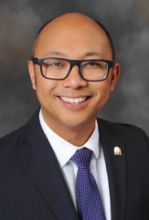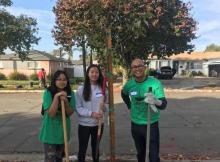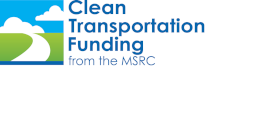
Joining the MSRC earlier this year, Claremont City Council Member Jed Leano is delighted to be a part of the Committee. Serving as the representative for the Southern California Association of Governments, Jed’s experience working on housing and equity issues will bring a new perspective to the MSRC’s work.
By day, Jed is an immigration attorney who has been practicing for 15 years. Before being elected to the Claremont City Council in 2018, he spent much of his time doing advocacy in the immigration arena. He founded a pro bono immigration clinic helping undocumented people who can’t afford legal counsel.
Since becoming a Council Member, a big focus of his work has been on affordable housing, homelessness and equity issues. He’s learned quickly that when you make good housing policy, it’s also good transportation policy, environmental policy, and sustainability policy. So, joining the MSRC is a part of his larger mission and goals.
When SCAG approached him to serve on the MSRC, it was a great opportunity because he understands that transportation, housing and climate policies can really be merged together to improve communities. So becoming an MSRC member was a chance to address so many issues at one time.
“Housing work deep down to its core is really equity work. When you’re fighting for housing you’re not just fighting for the physical housing unit, you’re fighting for a more equitable and just society. When we have disproportionate and inequitable outcomes in terms of clean air based on people’s zip codes, that creates lower life expectancies and worse health outcomes. So if we are going to get clean transportation policy right, we need to make sure that the benefits of the new technologies and new initiatives reach everybody regardless of their income level or where they live,” Jed said.
He said that when he reviews a monthly agenda to prepare for a meeting, he doesn’t just look at it as approving projects. “I’m literally trying to figure out whether I’m making a community healthier, and whether the improvements in these communities are being equitably spread throughout the region. We need to make sure that all rise with the tide.”
When he joined the MSRC, he saw it as a chance to not just think about what the agency does, but where they do it, when they do it, and how they do it – to make sure that transportation funding issues are looked at through the lens of equity.
One of the things he really wants to work on during his tenure with the MSRC is to ensure opportunity and technology marries with need. “We are benefitting from a tremendous wave of new technology and, in return, there is going to be some real economic benefit from that – communities are going to thrive from improvements in technology.” He hopes the MSRC can utilize that to benefit all communities including communities of color and communities that are economically disadvantaged. “We need to make sure that the benefits of new technologies and our new, clean economy impact everyone positively.”

He believes that the work of the MSRC is important because it can spread the benefits of these new technologies throughout the South Coast Basin. He pointed to Covid as an example of how benefits can be inequitably distributed. “At the macro level, California’s economy is thriving, but not all communities are seeing that. Some communities are struggling with health issues, wage stagnation, a housing imbalance, and poor environmental quality. Moving forward we can make good policy to ensure that all regions benefit from new transportation technologies and innovation. Our job is not to hamper innovation, but to let it happen and get out of the way, and make sure to lift everybody up. We want to make sure we are deliberate about setting the right priorities in terms of lifting everybody up.”
As for where transportation will be in the next ten years, Jed thinks we are in the midst of a generation shift. He looks at the new professionals just coming into the workforce and how their priorities are different. “They have different attitudes about owning cars and home ownership, and we need to plan with that in mind. Some of them are calculating that it’s cheaper not to own a car and use alternate modes of transportation.” He thinks we need to look at how people will be using transportation in the future. “I think this is going to be governed a lot by what the new consumers will look like. They will have a totally different concept of ‘what should I own, what should I spend, how should I live.’ And we need to keep them in mind when making decisions for twenty years from now.”
He thinks the future will not be a uniform and standard vision, but that everyone will see things differently depending on their perspective. “If we are going to reach our short term and long term climate goals, we need a comprehensive approach that helps eliminate emissions in all modalities of transit, considering the evolving preferences and priorities of new generations of commuters. Whether you use a car, bus, train, or shuttle, we should work as an agency to ensure that all people, no matter your mode of transit, have an emission-free option. We have to be open minded enough to realize that there will be a major portion of people that see their lifestyle different from what it was in prior generations.”
In looking at households of the future, he noted app-based delivery services as being a part of this lifestyle. “We have to think about what’s bringing the toothpaste or the toilet paper to your house. If it’s being delivered by some big diesel truck, we are defeating the purpose of cost savings and sustainability. If people are going to access basic living amenities without using fossil fuel burning cars, then we have to supplement that with something that is equally or less obtrusive environmentally.”
He finds that technology is really the driver of this. “If we can find a way to incorporate technological advancement and minimize or eliminate its environmental impact, it’s a win-win economically and environmentally.” He hopes to help the MSRC find these opportunities.
